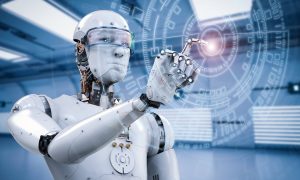- 20 November 2023
- 74
Balancing the Binary: Cyber Experts on AI’s Ethical Dilemmas

Balancing the Binary: Cyber Experts on AI’s Ethical Dilemmas
Introduction: Meet the Author
Hello, I’m Fred Wilson, a cybersecurity expert and an AI enthusiast. I have been working in the field of cybersecurity for over 15 years, helping organizations protect their data and systems from cyber threats. I have also been following the developments of AI technology and its applications in various domains, especially in cybersecurity. I believe that AI has the potential to revolutionize cybersecurity and make it more effective and efficient. However, I also recognize that AI poses significant ethical challenges and risks that must be addressed responsibly and securely. That’s why I decided to write this article, to share my insights and perspectives on the ethical dimensions of AI and cybersecurity. I hope you find it informative and engaging.
AI and Cybersecurity: A Double-Edged Sword
AI, or artificial intelligence, is the ability of machines to perform tasks that normally require human intelligence, such as reasoning, learning, decision making, and problem solving. AI can be classified into two types: narrow AI and general AI. Narrow AI is the AI that we use today, which is designed to perform specific tasks, such as facial recognition, speech recognition, or spam filtering. General AI is the AI that we aspire to create in the future, which is capable of performing any task that a human can do, such as understanding natural language, creating art, or playing chess.
AI has many applications and benefits in various fields, such as healthcare, education, entertainment, and of course, cybersecurity. Cybersecurity is the practice of protecting information and systems from unauthorized access, use, modification, or destruction. Cybersecurity is essential for ensuring the privacy, integrity, and availability of data and systems in the digital world. AI can help improve cybersecurity in many ways, such as:
- Detecting and preventing cyberattacks: AI can analyze large amounts of data and identify patterns, anomalies, and threats that human analysts may miss. AI can also automate the response and mitigation of cyberattacks, reducing the time and cost of recovery.
- Enhancing encryption and authentication: AI can generate and manage complex encryption keys and passwords that are hard to crack or guess. AI can also use biometric or behavioral factors, such as fingerprints, voice, or keystrokes, to verify the identity and access of users.
- Improving security awareness and education: AI can provide personalized and interactive training and feedback to users and employees on how to avoid and report cyber risks. AI can also simulate realistic cyber scenarios and test the security posture and readiness of organizations.
However, AI also has many challenges and risks in cybersecurity, such as:
- Creating new attack vectors and vulnerabilities: AI can be used by malicious actors to launch sophisticated and stealthy cyberattacks, such as phishing, ransomware, or denial-of-service. AI can also exploit the weaknesses and biases of other AI systems, such as adversarial examples, poisoning, or evasion.
- Increasing the complexity and uncertainty of cyber incidents: AI can make it harder to attribute and respond to cyberattacks, as the source, motive, and impact of the attacks may be unclear or hidden. AI can also generate false or misleading information, such as deepfakes, fake news, or propaganda, that can manipulate or deceive users and stakeholders.
- Raising ethical and social issues: AI can pose ethical and social dilemmas, such as privacy, accountability, transparency, fairness, and human dignity. AI can also affect the values, norms, and behaviors of individuals and societies, such as trust, autonomy, and responsibility.

The Ethical Challenges of AI in Cybersecurity
The ethical challenges of AI in cybersecurity are not only technical, but also moral, legal, and political. They involve not only the design and development of AI systems, but also their use and governance. They require not only the expertise and collaboration of cybersecurity professionals, but also the participation and deliberation of various stakeholders, such as users, customers, regulators, policymakers, and the public. Some of the ethical challenges of AI in cybersecurity are:
- Privacy: How can we protect the personal and sensitive data of users and organizations from unauthorized or inappropriate access, use, or disclosure by AI systems or actors? How can we balance the trade-off between security and privacy, such as the use of surveillance or data sharing for security purposes? How can we ensure the consent and control of users and organizations over their data and how it is processed by AI systems?
- Accountability: How can we assign and enforce the responsibility and liability of AI systems and actors for the outcomes and impacts of their actions or decisions in cybersecurity? How can we trace and audit the behavior and performance of AI systems and actors in cybersecurity? How can we ensure the compliance and alignment of AI systems and actors with the relevant laws, regulations, standards, and codes of conduct in cybersecurity?
- Transparency: How can we ensure the visibility and explainability of the processes and mechanisms of AI systems and actors in cybersecurity? How can we enable the access and understanding of users and stakeholders to the data, algorithms, and models of AI systems and actors in cybersecurity? How can we foster the trust and confidence of users and stakeholders in the reliability and validity of AI systems and actors in cybersecurity?
- Fairness: How can we prevent and mitigate the bias and discrimination of AI systems and actors in cybersecurity? How can we ensure the diversity and inclusion of users and stakeholders in the design and development of AI systems and actors in cybersecurity? How can we promote the equity and justice of AI systems and actors in cybersecurity?
The Opportunities of AI for Ethical Cybersecurity
The ethical challenges of AI in cybersecurity are not only problems, but also opportunities. They offer the possibility and potential of AI to enhance and improve the ethical aspects and dimensions of cybersecurity. They invite the creativity and innovation of cybersecurity professionals and stakeholders to design and develop AI systems and actors that are not only secure, but also ethical. They inspire the vision and aspiration of cybersecurity professionals and stakeholders to use and govern AI systems and actors that are not only ethical, but also beneficial. Some of the opportunities of AI for ethical cybersecurity are:
- Privacy: AI can help enhance the privacy of users and organizations by enabling the encryption, anonymization, or minimization of data, or by empowering the consent, control, or ownership of data. AI can also help respect the privacy of users and organizations by adhering to the principles of privacy by design, privacy by default, or privacy by choice.
- Accountability: AI can help improve the accountability of AI systems and actors by enabling the monitoring, evaluation, or verification of their actions or decisions, or by empowering the feedback, correction, or improvement of their behavior or performance. AI can also help ensure the accountability of AI systems and actors by adhering to the principles of accountability by design, accountability by default, or accountability by choice.
- Transparency: AI can help increase the transparency of AI systems and actors by enabling the disclosure, communication, or justification of their processes or mechanisms, or by empowering the access, understanding, or participation of users and stakeholders. AI can also help foster the transparency of AI systems and actors by adhering to the principles of transparency by design, transparency by default, or transparency by choice.
- Fairness: AI can help enhance the fairness of AI systems and actors by enabling the detection, prevention, or mitigation of bias or discrimination, or by empowering the diversity, inclusion, or representation of users and stakeholders. AI can also help promote the fairness of AI systems and actors by adhering to the principles of fairness by design, fairness by default, or fairness by choice.
How to Balance the Binary: Recommendations for AI Governance and Ethics
The ethical challenges and opportunities of AI in cybersecurity require not only the technical solutions, but also the governance frameworks and ethical guidelines. They demand not only the reactive responses, but also the proactive approaches and preventive measures. They call for not only the individual actions, but also the collective efforts and collaborative initiatives. Some of the recommendations for AI governance and ethics in cybersecurity are:
- Establish and enforce the ethical standards and best practices for AI in cybersecurity, such as the [Ethical Guidelines for Trustworthy AI] by the European Commission, the [Principles for a Human-Centric Approach to AI] by the OECD, or the [Responsible AI Practices] by Google.
- Develop and implement the ethical frameworks and tools for AI in cybersecurity, such as the [Ethical Impact Assessment] by the IEEE, the [Ethics Canvas] by the University of Oxford, or the [Ethics Guidelines Assessment List] by the European Commission.
- Promote and support the ethical education and awareness for AI in cybersecurity, such as the [AI Ethics and Society] course by the University of Edinburgh, the [AI Ethics] course by the University of Helsinki, or the [AI Ethics for Business] course by the University of Cambridge.
- Engage and involve the ethical participation and deliberation for AI in cybersecurity, such as the [AI Ethics Lab] by the Carnegie Mellon University, the [AI Ethics Initiative] by the World Economic Forum, or the [AI Ethics Network] by the University of Oxford.
Conclusion: The Future of AI and Cybersecurity
AI and cybersecurity are two of the most important and influential fields in the digital world. They have a symbiotic and synergistic relationship, as they can mutually benefit and support each other. However, they also have a conflicting and challenging relationship, as they can also pose ethical dilemmas and risks to each other. Therefore, it is essential and imperative to balance the binary, to find the optimal and sustainable equilibrium between the security and ethics of AI and cybersecurity.

